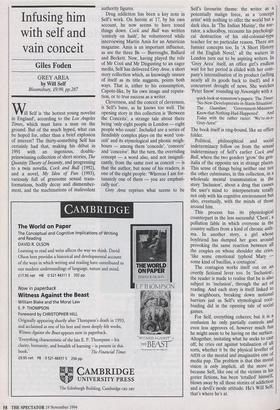Infusing him with self and vain conceit
Giles Foden
GREY AREA by Will Self Bloomsbury, £9.99, pp.287 ill Self is 'the hottest young novelist in England', according to the Los Angeles Times, which must have a man on the ground. But of the much hyped, what can be hoped for, other than a brief explosion of interest? The thirty-something Self has certainly had that, making his debut in 1991 with an ingenious, double- prizewinning collection of short stories, The Quantity Theory of Insanity, and progressing to a twin novella, Cock and Bull (1992), and a novel, My Idea of Fun (1993), variously full of gruesome sexual trans- formations, bodily decay and dismember- ment, and the machinations of malevolent authority figures.
Drug addiction has been a key note in Self's work. On heroin at 17, by his own account, he now seems to have toned things down. Cock and Bull was written `entirely on hash', he volunteered while interviewing Martin Amis for an American magazine. Amis is an important influence, as are the three Bs — Burroughs, Ballard and Beckett. Now, having played the role of Mr Cool and Mr Disgusting to an eager media, Self has delivered Grey Area, a short story collection which, as knowingly unsure of itself as its title suggests, points both ways. That is, either to his consumption, Capote-like, by his own image and reputa- tion, or to true success as a writer.
Cleverness, and the conceit of cleverness, is Self's bane, as he knows too well. The opening story in this collection is 'Between the Conceits', a strange tale about there being 'only eight people in London — eight people who count'. Included are a series of fiendishly complex plays on the word 'con- ceit' and its etymological and phonic neigh- bours — among them 'concede', 'concern' and 'conceive'. But the turn, the overriding concept — a word also, and not insignifi- cantly, from the same root as conceit — is that the author, but none of his readers, is one of the eight people: 'Whereas I am for- tunately one of them — you are emphati- cally not'.
Grey Area reprises what seems to be Self's favourite theme: the writer as a potentially malign force, as a 'concept artist' with nothing to offer the world but a dark idea. In 'The Indian Mutiny', the nar- rator, a schoolboy, recounts his psychologi- cal destruction of his old-colonial-type teacher for no particular reason. There are funnier concepts too. In 'A Short History of the English Novel,' all the waiters in London turn out to be aspiring writers. In `Grey Area' itself, an office girl's endless wait for her period is elided with her com- pany's internalisation of its product (selling nearly all its goods back to itself) and a concurrent drought of news. She watches `Peter Snow' rounding up Newsnight with a quick-look-at-tomorrow's-papers: The Times: `No-New-Developments-in-Stasis-Situation'. The Guardian: `Government-Ministers- Knew-that-Nothing-Had-Happened'. And Today with the rather racier: 'We're-in-a- Grey-Area!'
The book itself is ring-bound, like an office folder.
Political, philosophical and social indeterminacy follow on from the sexual indeterminacy of Self's earlier Cock and Bull, where the two genders 'grow' the gen- italia of the opposite sex in strange places. This sense of things being neither one nor the other culminates, in this collection, in a wholesale mental transmutation in the story 'Inclusion', about a drug that causes the user's mind to interpenetrate totally not only with his cognitive environment but also, eventually, with the minds of those around him.
This process has its physiological counterpart in the less successful 'Chest', a pollution fable in which everyone in the country suffers from a kind of chronic asth- ma. In another story, a girl whose boyfriend has dumped her goes around provoking the same reaction between all the couples on whose shoulder she cries, `like some emotional typhoid Mary some kind of bacillus, a contagion'. The contagion works itself out on an overtly fictional lever too. In 'Inclusion', the reader is made to realise that he is also subject to 'inclusion', through the act of reading. And each story is itself linked to its neighbours, breaking down notional barriers just as Self's etymological root- binding did in the opening tale of social games.
For Self, everything coheres; but it is a confusion he only partially controls and even less approves of, however much fun he might seem to be having on the surface. Altogether, imitating what he seeks to cast off, he cries out against totalisation of all sorts, whether it be the physical leveller of AIDS or the mental and imaginative one of media pap. The problem is that this moral vision is only implicit, all the more so because Self, like one of the victims in his gorier fictions, has been 'totalled' himself, blown away by all those stories of addiction and a devil's mode attitude. He's Will Self, that's where he's at.


















































































 Previous page
Previous page